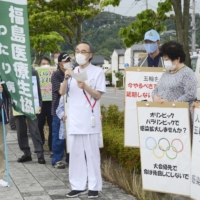With the Tokyo Olympics opening despite a resurgence in new cases of coronavirus infection in Japan’s capital and elsewhere in the country, medical workers and people who have lost their loved ones due to COVID-19 have voiced concerns.
A 26-year-old nurse in the Kansai region contracted the coronavirus in early May as an infection cluster occurred at her workplace. Still suffering aftereffects such as fatigue, stomach inflammation and dizziness, she has been unable to return to work.
“It took time for me to find a facility where I could be hospitalized (when I developed COVID-19 symptoms),” she said. “I’m afraid that the medical system will collapse again, due to the Olympic Games.”
“Honestly speaking, I’m not interested in the Olympics, so I will not watch the Games on television,” she said. “I can’t rejoice at the start of the Olympic Games at a time when my colleagues have been busy treating severely ill COVID-19 patients.”
A Tokyo woman in her 50s who lost her father in his 80s last year due to the coronavirus said, “My father’s death did not seem so real to me just after he passed away, but I have recently started to feel a sense of loss.”
The woman showed some understanding for holding the Olympics, saying, “Canceling a fun event would require courage.” Still, she said, “COVID-19 is terrible because it spreads quietly even though thorough measures against infection are taken.”
Naoto Ueyama, leader of the Japan Doctors Union, criticized the organizers of the Olympics, saying, “While Japanese people have been urged not to travel across prefectural borders, foreigners related to the Olympics are coming to Japan by crossing national borders.”
If the organizers fail to obtain understanding from Japanese people, they will be unable to win cooperation from the public for refraining from various activities and infections cannot be stopped as a result, he warned. “I’m vaccinating people even on my days off, but I’m losing motivation due to policy inconsistency (among the organizers),” he complained.
Ueyama also expressed concern over the highly transmissible delta variant of the coronavirus.
“Medical workers are likely to see their burdens increase as the number of heatstroke sufferers is also expected to rise in summer,” he said, warning: “In the western prefecture of Osaka, some COVID-19 patients had died without being admitted to hospital. I’m concerned that the same thing will happen in Tokyo.”
“If it’s difficult to cancel the Olympics, coronavirus polymerase chain reaction tests on and quarantining of Olympics-related people should be conducted more thoroughly,” Ueyama said.
The Tokyo Olympics organizing committee said Friday that cumulative novel coronavirus infection cases among people related to the Games reached 106 the same day.
On the day, 19 people, including three who are staying at the Olympic Village in the Harumi waterfront district in the Japanese capital, were newly confirmed infected with the coronavirus. The daily tally was largest since the committee began July 1 to announce COVID-19 positive cases among those related to the Olympics, set to officially kick off at the opening ceremony Friday night.
Of the 19 people, three are athletes from abroad, including one staying at the athletes village. Ten of the other 16 are Olympic officials, three are outsourced workers and three are media people, according to the committee.
In a time of both misinformation and too much information, quality journalism is more crucial than ever.
By subscribing, you can help us get the story right.
SUBSCRIBE NOW



